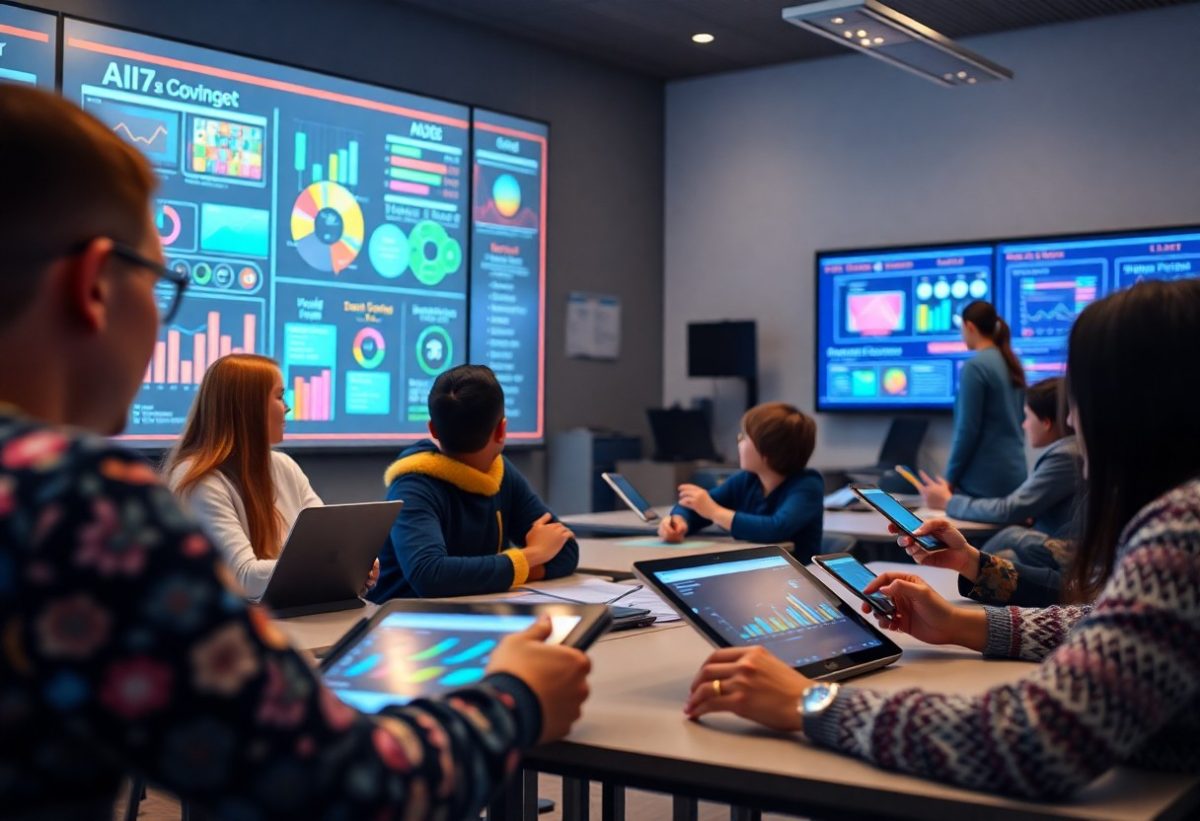Course creation is evolving rapidly, and with the integration of artificial intelligence (AI) into Learning Management Systems (LMS), you have the opportunity to enhance your instructional design like never before. This transformative technology not only streamlines the development process but also offers personalized learning experiences tailored to your audience’s needs. As you explore the potential of AI in course creation, you’ll uncover valuable insights that can shape your curriculum strategy, improve learner engagement, and ultimately lead to more effective educational outcomes.

The Transformational Role of AI in Course Design
Streamlined Content Generation
AI streamlines content generation by automating the creation of learning materials. Tools like natural language processing (NLP) allow you to produce quizzes, summaries, and even full course outlines with minimal effort. This not only saves time but also ensures that your materials are up-to-date, accurate, and aligned with current educational standards. With AI algorithms analyzing trending topics and learner feedback, you can create relevant content that resonates with your audience.
Personalized Learning Pathways
AI enables the crafting of personalized learning pathways tailored to individual needs. By analyzing learners’ interactions with the course materials, preferences, and progress, AI can suggest customized modules that cater to their unique learning styles and paces. This approach not only improves engagement but also enhances retention rates, as students are more likely to succeed in a personalized learning environment.
For instance, platforms powered by AI can identify knowledge gaps and adjust the curriculum in real-time, presenting supplementary resources or advanced topics based on a student’s mastery level. This adaptability means you can offer a seamless educational experience that keeps learners motivated and challenges them appropriately. Tracking metrics such as completion rates and test scores allows you to easily refine these pathways, ensuring your course meets the evolving demands of your learners.

The Automation of Assessment and Feedback
Real-Time Analytics for Learner Engagement
AI-driven Learning Management Systems (LMS) provide real-time analytics that enable you to monitor learner engagement closely. These systems can track participation, quiz scores, and assignment completion rates, offering insights that can influence instructional approaches. By quickly identifying trends in learner behavior, you can adapt course content and teaching methods to maximize engagement and success for your learners.
Reducing Instructor Workload Through Intelligent Grading
Intelligent grading systems leverage AI technologies to automate scoring, allowing you to focus on providing personalized feedback rather than spending hours on evaluation. This innovation not only saves time but also enhances objectivity in grading decisions. AI can analyze various elements of student submissions – from structure to content accuracy – ensuring consistent application of grading criteria across different submissions.
The shift towards intelligent grading is gaining traction across many educational institutions, with studies showing that automated systems can grade multiple-choice questions with 95% accuracy and even provide useful analytics on essay submissions. By utilizing these technologies, you can reduce grading time by up to 30%, giving you more capacity for interacting with students directly. Furthermore, AI-powered systems can highlight common misconception trends, allowing you to address these issues effectively in subsequent lessons, thereby creating a more robust learning environment tailored to your learners’ needs.

Enhancing the Learner Experience with AI
Adaptive Learning Environments
With AI, adaptive learning environments offer personalized pathways for learners, adjusting the content and style of delivery based on your unique learning pace and preferences. By analyzing your interactions, such as quiz scores and engagement metrics, AI algorithms can identify where you excel or struggle, allowing the learning experience to adapt in real-time. This means each learner can benefit from a customized curriculum that feels more relevant and engaging, ultimately increasing knowledge retention and satisfaction.
AI-Powered Tutoring Systems
AI-powered tutoring systems simulate one-on-one interactions to guide you through challenging material, making learning more accessible than ever. These systems leverage natural language processing and machine learning to provide instant feedback, answer questions, and suggest additional resources tailored to your individual needs. By adopting this technology, educational institutions can enhance their support offerings and empower you to take control over your learning experience.
One noteworthy example of AI-powered tutoring systems is Carnegie Learning’s MATHia, which combines cognitive tutoring with adaptive learning strategies. By assessing your problem-solving approaches, MATHia customizes practice problems to target specific areas for improvement, empowering you with targeted support. Furthermore, these systems are not limited to math; they also cater to diverse subjects, from language learning to sciences, making them versatile aids in your educational journey. With ongoing advancements in AI, expect these systems to become increasingly sophisticated, providing even more nuanced support tailored to your personal learning style.
The Future of Collaborative Learning Platforms
AI-Driven Peer Learning and Interaction
AI facilitates a dynamic peer learning environment by intelligently connecting you with learners who share similar interests, strengths, or learning goals. With algorithms that analyze your interactions, it helps foster meaningful discussions, enabling you to exchange insights and collaborate on projects with peers who bring complementary skills to the table.
Facilitating Global Classrooms with AI Support
AI technologies have the potential to connect learners across the globe by overcoming language barriers and time zone challenges. Through real-time translation services and personalized scheduling, you can engage with a diverse range of peers, enriching your educational experience and creating a vibrant, inclusive learning community.
As you engage in global classrooms supported by AI, imagine working on projects with students from different cultural backgrounds. AI tools can facilitate real-time translations, ensuring you understand and appreciate various perspectives. Collaborative assignments could leverage tools like virtual whiteboards and discussion forums, enabling seamless communication despite geographical divides. This global interaction not only broadens your understanding of the subject matter but also fosters empathy, preparing you to thrive in a multifaceted workplace. Encouraging these connections can lead to innovative ideas and solutions that resonate universally, ultimately shaping the next generation of educated leaders.
Ethical Considerations in AI-Enhanced Course Creation
Data Privacy and Student Consent
Your first concern in implementing AI for course creation revolves around data privacy and the consent of students. As educational institutions collect vast amounts of personal information—ranging from demographics to learning habits—ensuring secure data storage and handling practices becomes paramount. You must establish clear policies that outline how student data is used, ensuring transparency while obtaining explicit consent. This not only helps in compliance with laws like GDPR but also fosters trust between you and your learners.
Bias in AI Algorithms and Its Implications
AI algorithms can inadvertently introduce biases that affect course content and learner experiences. If the data used to train these systems is not representative of the diverse student population, certain groups may be disadvantaged. Your AI-driven recommendation systems could favor majority narratives or learning styles, potentially alienating underrepresented voices.
Research has demonstrated that biased algorithms can lead to significant disparities in educational outcomes. For instance, an analysis from Stanford University pointed out that AI systems trained on skewed datasets resulted in unfair academic recommendations that disadvantaged students from certain racial or socio-economic backgrounds. As you incorporate AI into course creation, actively working to ensure inclusivity and mitigate bias is imperative. Regular audits of AI systems, inclusive dataset curation, and diverse input during the development process can help create a more equitable learning environment—one that empowers all your students to succeed.
Preparing Educators for an AI-Infused Landscape
Training Programs for Instructors
Incorporating AI into course creation necessitates robust training programs for instructors. These programs should focus on equipping you with the skills needed to effectively utilize AI tools in your teaching strategies. Workshops and online modules that emphasize the integration of AI functionalities, such as automated assessment tools or personalized learning pathways, can greatly enhance your confidence and competence in this evolving landscape.
Transforming Pedagogy with Technological Adaptation
The integration of AI into your educational framework requires more than just a technical upgrade; it calls for a reimagining of pedagogy. By embracing AI-driven analytics, you can tailor your instruction based on real-time feedback and learning patterns, adapting your approach to suit diverse learning needs. Innovative tools that analyze student engagement can inform your lesson planning, emphasizing areas where learners struggle and offering interactive resources to bolster understanding.
Innovative pedagogical strategies will emerge as you harness AI capabilities to create adaptive learning experiences. For instance, platforms that track student progress can help identify knowledge gaps and suggest curated content, fostering a personalized learning environment. With AI’s ability to streamline administrative tasks, you can devote more time to developing engaging curricula. Additionally, leveraging collaborative AI features may promote team-based projects, encouraging student interaction and peer learning, ultimately enhancing educational outcomes while nurturing critical thinking skills.
Innovations on the Horizon: What’s Next for AI in LMS
Future Trends in Course Creation Technology
Your future in course creation technology looks bright with AI-driven innovations on the rise. Expect advanced analytics that empower educators to make data-backed decisions about curriculum development. Enhanced collaboration tools will enable seamless integration of multimedia, allowing for more interactive content that engages learners effectively. With the growth of AR and VR technologies, immersive learning experiences will also become a staple, making courses not only informative but also engaging and transformational.
Speculations on Deep Learning and Course Customization
Deep learning is set to revolutionize how courses are customized for individual learners. By analyzing vast amounts of data, AI can identify unique learning styles, preferences, and gaps in knowledge, facilitating hyper-personalized learning pathways. This means that every learner can engage in tailored content that resonates with their specific needs, enhancing motivation and retention.
As deep learning algorithms evolve, their ability to assess and predict learner behavior will lead to increasingly sophisticated customization methods. Imagine an LMS that not only adapts content in real-time but also suggests supplementary materials or peer groups based on your learning habits. This level of personalization could transform your educational journey, allowing you to progress at your own pace while receiving the exact support and resources you need. Furthermore, the system might proactively identify when you struggle with a topic, adjusting the course material accordingly or providing additional quizzes to reinforce knowledge retention.
The Big Picture: Shaping Education Through AI
Balancing Technology and Traditional Teaching Methods
Integrating AI into educational settings requires a delicate balance with traditional teaching methods. Instructors retained their roles as facilitators, utilizing AI insights to enhance teaching practices, while still relying on classic pedagogical strategies. By combining empathy and personal interaction with data-driven approaches, you create a more robust learning environment that accommodates diverse learning styles and fosters engagement.
Long-Term Projections for Educational Delivery
The trajectory for educational delivery over the next decade suggests a significant shift towards more hybrid models. Traditional classroom settings will blend with online platforms, enhanced by AI-driven personalization tools. As AI becomes increasingly sophisticated, educators will have more opportunities to leverage flexible delivery methods tailored to individual student needs, optimizing engagement and outcomes.
In practical terms, long-term projections indicate that by 2030, nearly 70% of all courses may incorporate some form of AI technology. This integration allows for a more fluid model of learning, where your experience is shaped not just by set schedules but by your progress and preferences. Tools such as AI mentors could provide around-the-clock support, while advanced analytics inform educators about classroom dynamics in real time. The future classroom will not be a rigid structure, but a responsive, adaptive environment that continuously evolves in tandem with learner needs and technological advancements.
Final Words
From above, you can see that the integration of AI in Learning Management Systems is transforming course creation, making it more efficient and personalized. As you embrace these technologies, you’ll be able to tailor educational experiences that resonate deeply with learners, enhance engagement, and expand accessibility. As AI continues to evolve, it’s necessary to stay informed about emerging trends and tools that can further enrich your course creation journey, ultimately leading to more impactful learning outcomes for your audience.
FAQ
Q1: How will AI enhance personalized learning experiences in course creation?
A1: AI can analyze learner data to understand individual strengths, weaknesses, and preferences. This enables the creation of tailored courses that adapt in real-time to each learner’s pace and learning style. By assessing previous interactions and performance, AI can recommend specific learning paths or resources, ensuring that each student receives a customized educational experience that is most effective for them.
Q2: What role will AI play in content development for online courses?
A2: AI tools can assist educators and course creators in generating and organizing content more efficiently. By using natural language processing and machine learning algorithms, AI can help in curating relevant materials, suggesting topics based on current trends, and even generating quizzes and assessments that align with the course objectives. This not only streamlines the content creation process but also ensures that the material is continually updated and relevant.
Q3: How might AI influence the assessment and feedback process in learning management systems?
A3: AI can significantly improve the assessment process by providing more nuanced insights into student performance. Automated grading systems can evaluate assignments and tests accurately and quickly, while AI-driven analytics can identify patterns in student responses. Furthermore, AI can offer instant feedback to learners, pinpointing areas for improvement and suggesting specific resources or exercises to address those gaps, fostering a more interactive and supportive learning environment.

